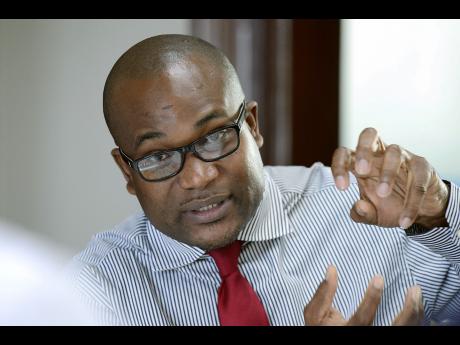Economist warns of massive tax package in April 2017
Densil Williams, economist and executive director of the Mona School of Business and Management, says Jamaicans should brace for a massive tax package come April 1, 2017, to fund phase two of the revised so-called $1.5 million tax-relief initiative.
At a Gleaner Editors' Forum yesterday at the company's North Street offices in Kingston, Williams said the Government would have to raise an additional $18 billion to fund its tax policy at the start of the next financial year in April 2017.
He, however, signalled that there was at least one option that could spare the country from the huge tax burden: that of continuing to draw down the current $11 billion from the National Housing Trust (NHT), which is being used to shore up the International Monetary Fund programme. With the four-year extended fund facility under the IMF programme coming to an end in March 2017, the NHT funding would no longer be needed.
NHT solvency issues
Williams argued that the option of using the $11 billion from the NHT to fund the tax policy, along with a number of new measures to benefit contributors of the Trust come July 1, could also create solvency issues at the housing entity.
Indicating that the entire tax package for the next fiscal year would amount to about $31 billion, Williams said: "If you think about it, (the Government) will have to raise at least $18 billion more come April 1 and hoping that you keep the existing $13.8 billion that you have. Now, nobody, has said how that is going to actually work."
In his contribution to the debate on the Appropriations Bill in the Senate on Tuesday, Leader of Opposition Business Senator Mark Golding said the country could expect a tax package in the region of $20 billion next year to fund the second part of the Government's tax initiative.
Finance and the Public Service Minister Audley Shaw had announced a $13 billion tax package to fund year one of the tax give-back, which was an election promise.
Golding argued that the giving up of taxes on income between the current threshold of $592,000 and $1,000,000 is to be paid for by immediate additional taxes on gasolene/diesel, new taxes on liquefied natural gas and higher taxes on heavy fuel oil used to generate electricity, and an increase in departure tax. "These taxes will increase transportation costs, and flow through to prices, generally, across the economy. The resulting inflationary effect will be a tax on the poor and vulnerable in our society those who use public transport, those who earn less than $592,000, the unemployed, pensioners, and so forth," he said.
In his Budget presentation, Opposition Spokesman on Finance Dr Peter Phillips also warned that Jamaicans would be hit with more taxes as the Government seeks to maintain a balanced Budget.

